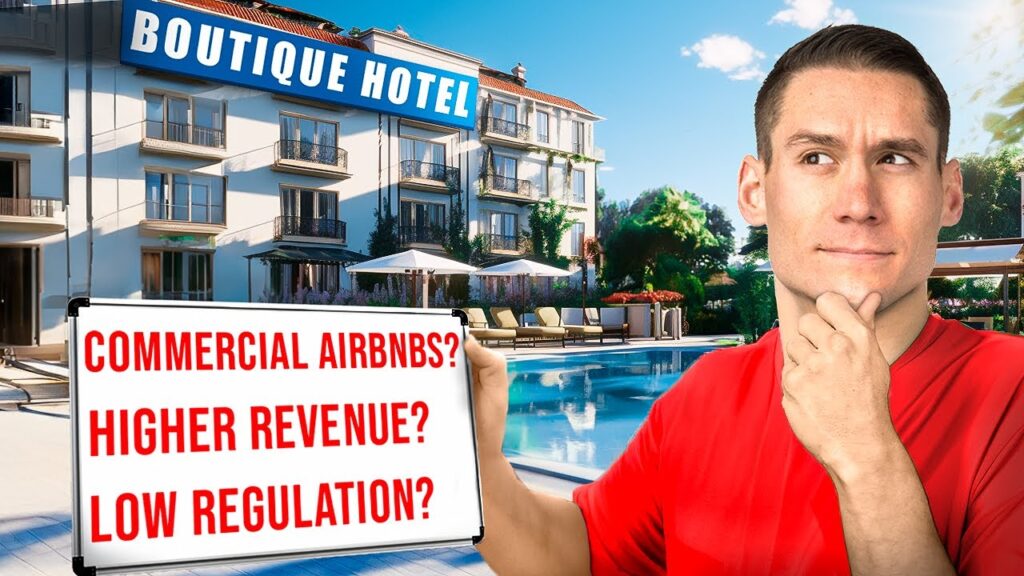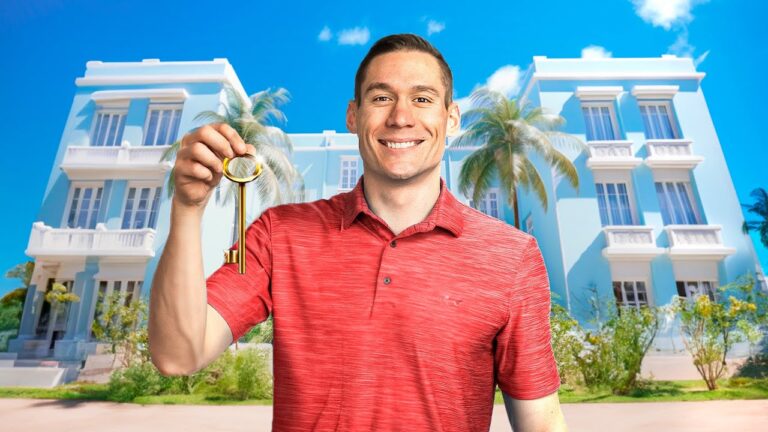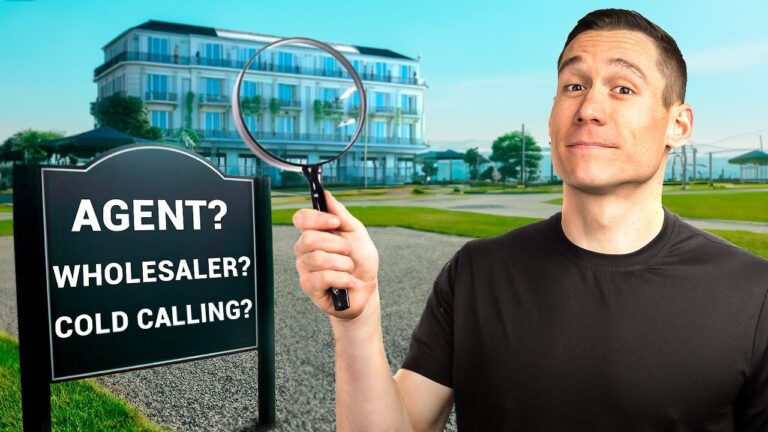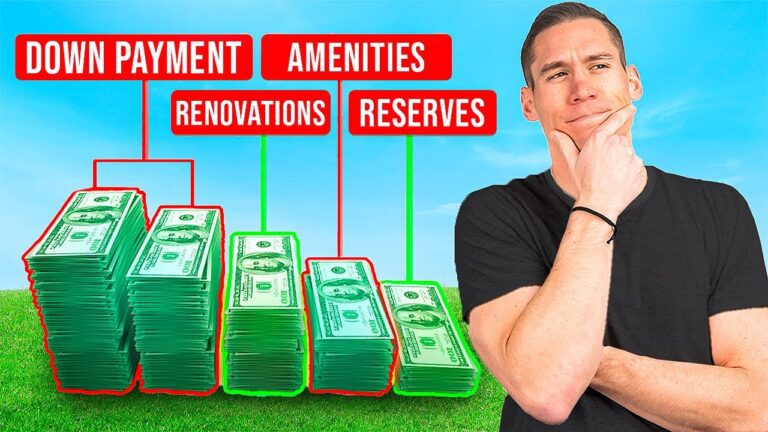Have you heard of Boutique Hotel Investing and wondered what the heck it means!? You’re not alone, and that’s what I am going to break down for you today. Imagine being able to buy 10 or more short-term rental units all at once – that’s essentially what boutique hotels are. They help you get more units, faster. But what is it? And how does it work?
Understanding Boutique Hotel Investing is probably easiest using an analogy. Because it is a big, involved real estate investing strategy, with a lot of variables. So, I’ll use an analogy that I think will resonate well as a framework.
I have a quick story for you to set the stage! I have a friend who buys a lot of traditional single-family rentals. He had so many at one point that the burden of all those deals and all those closings to get the deals started to add up. Then he realized if he just bought ONE Multifamily property, he could make the same amount (and potentially more) compared to buying a ton of individual houses to rent out and it would be a lot easier to manage because they would all be together. The lightbulb clicked for him, and that’s what he did.
Buying Boutique Hotels is the SAME thesis but in the short-term rental industry. If you’re reading this, you’ve probably at least heard of Airbnb investing where you buy a single-family house and list it onAirbnb. But what if I told you there was a way to do short-term rentals at SCALE, meaning you make more and it’s easier to manage, by buying a property like a Boutique Hotel?
Think of Boutique Hotel Investing as short-term rental or Airbnb investing but with commercial properties instead of residential single-family houses. With commercial real estate, the larger number of units ona single property like a Boutique Hotel gives you better economies of scale than a traditional single-family house, and that scale provides tons of benefits. If you had a bunch of different individual houses, you’d have a variety of different materials to replace when things break and different furnishings and decor in every single one. But with a Boutique Hotel, all of that is standardized across the whole property which can lower your expenses AND your operational burden.
For example, in Multifamily Real Estate you buy an older underperforming building with a multiple of units, renovate the property, and then rent those units at higher rental rates to long-term tenants, usually on 12-month leases. And within the entire “Commercial Real Estate” umbrella (which is what a Multifamily property is classified as), when you increase the income of the property, it increases the value of the property as well.
With boutique hotels, you are doing the same thing. You buy a hotel, motel, cabin community, or other similar commercial STR property and then rent those units as short-term rentals to guests. You can buy an old, ugly, poorly performing hotel, renovate it, redesign it to make it really cool, and then increase your nightly rates. Which as mentioned, increases the entire value of the property! Then you can decide to refinance the property and hold it to keep the steady cash flow coming in or sell it for a profit and move onto the next deal.
You can see from the example that the high-level business model is the same between Multifamily and Boutique Hotels. It has the same benefit of scaling from residential houses to commercial properties, it’s just a difference between long-term rentals & short-term rentals and the scale at which you do it.
What Are Boutique Hotels?
At this point, you might be wondering: what exactly is a boutique hotel? A boutique hotel is a smaller independent hotel (generally 50 units or under) that focuses on elevated design and guest experience and is generally located in a trendy destination.
- Small
- Independent
- Unique
- Trendy location/destination
And where I see the most opportunity in this space right now is in outdated, underperforming, mom-and-pop operated hotels that have value-add potential where you can come in and renovate and redesign the property, bring it online to Airbnb and the other OTAs, and create a professional direct booking website to increase the appeal, demand, and nightly rates.
What I love is that these older mom-and-pop owners have held the properties for a long time, so they have little to no debt on the property and you can structure a great seller financing offer that they are more than happy with that saves you from going to a bank putting 25% down and paying 9-12% in interest. Three out of my five boutique hotels have been seller-financed, and in every case, the opportunity has been on the table. You can get great deals with potentially great financing.
I’ll give an example of one of my boutique hotel deals so you can see how the strategy plays out.
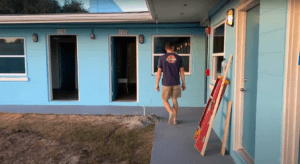

This hotel was a pig in mud when I bought it, but I had the vision and understanding of how to take it from a piece of crap and turn it into a cool cash-flowing property with the right strategy and renovation plan.
This is a property we picked up for $1.1M and increased the revenue from $200k to $600k – so we 3x the gross income. We sold that for almost $1.9M and made almost $800k in equity in just over a year and a half. Yes, $800k of equity in A YEAR AND A HALF! For context, that sales price would have been a lot higher, but was largely because we had to sell in a time of rising interest rates because my partner and I split up, so a good deal even in bad circumstances.
This property was 18 units, a mix of studios and 2 bedrooms with a manager’s unit that the past owner lived in that we also converted into a premium unit with a bedroom and full kitchen. When we bought it, it was outdated, ugly, smelly, and run down – all the things that make for a great deal with the right opportunity!
What made it a great deal was that it was 100 yards away from 2 public beach accesses in Panama City Beach, and that market sees about 17 million visitors per year. It’s a huge beach destination in the panhandle of Florida. I lived there and was familiar with the market and had other STRs that did really well. So, I knew that by buying this property, renovating it, and redesigning it with fresh furniture and decor, it would attract guests who would pay much higher rates.
At the time we bought it, it was operated as weekly rentals to mostly longer-term tenants. It was basically workforce housing. The property had a handful of vacant units that needed full renovations, so it was primed up to be renovated and all the units rented as short-term rentals and put up on Airbnb and all the other booking websites to get exposure. And that’s exactly what we did to over 3x the revenue. The property performed pretty well for us for a year and a half before we sold it.
If you’d like to see a lot more in-depth content about my past deals and how I renovate my boutique hotels, you can go to my YouTube channel to see some of the past videos I’ve posted about those hotel deals.
Scale – Bigger Deals, Bigger Impact
Now just like the jump from single-family homes to multifamily properties, the jump from STRs to Boutique Hotels takes more money. You’re no longer buying single-family homes with easy financing options. I’ve done a bunch of those, and they can be pretty easy. You can usually fund it yourself, or maybe bring in a money partner if you need to. With normal single-family houses, you don’t need very much outside capital.
But with Commercial properties like Boutique Hotels, the purchase prices are going to be larger. But here’s the secret: I’ve done 6 boutique hotel deals and I’ve used investors or partners on every single one. I have been able to find the deals, and then raise money from investors to fund the deals. So, you can still get into Boutique Hotels with little of your own cash. In an upcoming post, I’ll show you how you can find investors, structure your deal, and raise the money to fund it, so be sure to follow along as I give out all my secrets that no one else wants to tell for free like this.
How Hotels are Valued Compared to Single-Family STRs
Now what I love about doing THIS strategy with Boutique Hotels is that you can get huge jumps in property values. You might be able to double or even triple the income of the property like I’ve done with most of mine, which like I mentioned earlier, is going to create a ton of equity for you and your investors because of the increased property value.
Let’s look at this contrast between how single-family homes are valued and how hotels are valued. With single-family homes, because they are residential real estate, the value is based on comparable sales. That means a house is only worth as much as a similar house in the same neighborhood.
So if you are valuing a 3 bedroom 2 bathroom house with 1,500 square feet that was built in 2005, all other things equal, that house is only going to be worth as much as a 3 bedroom 2 bathroom house with 1,500 square feet that was built in 2005 in that same area.
With boutique hotels, because they are commercial real estate, your value is based on the net operating income (NOI) – This is the Income Approach. Investors are who buy commercial real estate, and so the properties are valued by the income they produce. That is the NOI, which is the gross income minus the operating expenses. Then to get the value, the market cap rate is applied, usually somewhere between 7-10% depending on the market and the quality of the hotel. A luxury property in a good market is going to trade at a lower cap rate than an economy hotel in a tertiary market for example. So, the value of a boutique hotel is the NOI divided by the cap rate.
A hotel with $500,000 in NOI at an 8% cap rate will be valued at 6,250,000. And if you increase the NOI or if the cap rate goes down, meaning investors are willing to pay more for the same income stream, then the value goes up. This is especially important in the boutique hotel market today because it’s just catching momentum. When I started with boutique hotels 3 years ago, not many people were buying them. And now there is growing demand for the asset class. So, if you buy today at a cap rate and demand keeps going like it is today, you might be able to sell your hotel at a lower cap rate in the future which will increase the value.
Now if you bought that property with $500,000 in NOI, the cap rate stayed the same, and you were able to increase the NOI to $1,000,000 (doubling NOI is very reasonable and common in this space), then at the 8% cap rate that same property would be worth $12,500,000! By doubling the income, you double the value. That’s the beauty of commercial real estate.
Boutique Hotels Vs. Traditional STRs
If you have Airbnbs of your own, you know how much time managing the properties can take. One of the amazing reasons to buy Boutique Hotels is because with the scale you get much higher revenue. That increased revenue allows you to take yourself OUT of the day-to-day management and be able to hire people to manage the property for you.
With residential STRs, you’re often just a little too small to hire the role that would give you your time back. You’re in a catch-22 of needing to get another house or two to increase your revenue so you can scale yourself up and out and achieve a point of freedom that brought you into the STR space in the first place. Yet you don’t have the time to go out and find and put together a new deal.
So, you get stuck at what I call the Tier One level of financial freedom where you have enough money coming in to replace your W2 job, but not enough to replace you in the new job you create for yourself. And you want to take it to the next level and get the lifestyle that you know is possible where you can take time off and your business is fine. Where you can travel and manage your business from anywhere – and make more money without working more.
In my experience, investing in boutique hotels is how you can jump past that no-man’s land – or at least how I did it. Instead of working more hours, you do more productive, more valuable work. I started with residential STRs and Airbnbs and it was great cash flow. I surpassed my W2 income and was feeling ontop of the world. But the thing is, I was never able to get myself out of the day-to-day tasks that ate up all my time. And if you’re anything like me, you listen to stuff about “outsource this” or “hire a person for that” or “think Who not How”. Like that’s awesome, I would love to – but I’m like just barely financially free and able to cover my expenses and provide for myself.
When I got my first boutique hotel deal, I didn’t realize at first how much it was going to help the overall quality of my business AND my life. My business got more efficient and made more money while I worked in the business less. Your goal as an entrepreneur should be some version of that – to make more while working less because that’s what a well-run business does. A well-run business doesn’t need constant attention or input from the owner but instead continues to service customers or provide its product because of the team you build and the systems you put in place. This post and the ones to follow are to show you how you scale to that point faster.
Benefits of Zoning
One of the best aspects of Boutique Hotels is that because they are zoned as Commercial properties, you don’t need to worry about any potential ban onshort-term rentals like we see happening all over the country. For instance, New York recently banned all short-term rentals, and similar legislation has happened in the big California markets, Dallas, and Atlanta. It’s becoming more and more common across the country as local governments are finally catching up to regulation.
But hotels are zoned for nightly rentals! Therefore, you are insulated from regulation. And what’s even better, regulation happening in your market can actually help you. I experienced that in Lake Tahoe where I owned 2 boutique hotels.
Shortly after we bought those hotels, the city of South Lake Tahoe voted to heavily regulate STRs by instituting permits and limiting them to homeowners only up to 30 days per year. It almost instantly cut out a big chunk of our competitors and we came out untouched by the regulation because our properties were zoned for nightly rentals. After all, they are hotels.
It cuts out the worry of investing a bunch of money or raising money from investors only to have your hopes crushed by your area outlawing short-term rentals. And it makes a good case for you to go to markets with regulations and look for boutique hotel deals. Just because there is less competition doesn’t do anything to demand.
We exceeded our best expectations in Tahoe because we couldn’t have anticipated the regulation that cut everyone else legs out from under them. But the availability of Airbnbs didn’t slow down travel to Tahoe. And the same is true for New York, or Dallas, or Atlanta, or wherever regulation happens next. These regulating markets aren’t seeing reduced travel, and that regulation could lead to you having less competition and more control over your rates and earning more money. Investing in boutique hotels is how you can stay ahead of the curve!
What To Do Now?
At this point, I hope you guys are hyped up for boutique hotels. This asset class has so much untapped potential and opportunity to come. It’s only just now catching on though the demand and the metrics underlying the strategy are as solid. I’ve gone through buying 6 hotels over the last 3 years, and have my best deal under contract now. From what I’ve seen, it’s getting better because of macro-level factors like too much competition on Airbnb and guest expectations of Airbnb changing.
If you guys want to get your hands on a free resource to scale your STR portfolio, I’ve created My 5 Top Tips to Scaling a 7-Figure STR Business. These are the things that I’ve learned through building my STR business that make such a huge difference not just in the quality of your business but the quality of your life with being able to manage what would otherwise be a high-touch and high-demand business.
If you put the right things in place, you can be just as hands-off as any other investment strategy. And I’ve done it and seen it. You just need to know what to do and have the right guide. That’s why I created this free resource for you.
I want to arm you with the best information available on boutique hotel investing. Stay tuned for the rest of the series where we’ll dive into how to find, fund, and operate your boutique hotels and what you should think about before investing.

